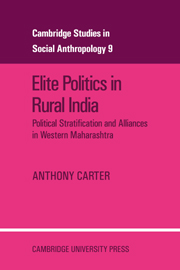 Elite Politics in Rural India
Elite Politics in Rural India 1 - The problem
from Part I - Introduction
Published online by Cambridge University Press: 02 March 2010
Summary
This study is a descriptive analysis of political stratification and political alliances in rural Western Maharashtra. My primary focus is Girvi, a large village on the southern boundary of Phaltan Taluka near the northwest corner of Satara District, but the analysis also deals with more inclusive political arenas: Phaltan Taluka, Maharashtra Legislative Assembly constituencies which overlap with Phaltan Taluka and, to a limited degree, Satara District. I make a few references to political stratification and alliances in Phaltan Municipality as well in order to contrast political activity in a small market town with that in more strictly rural areas.
POLITICAL STRATIFICATION AND UNSTABLE ALLIANCES
It long has been a commonplace among interested participants and observers that one important feature of Indian politics is the fact that power in the countryside is distributed unequally. Thus Mountstuart Elphinstone, Commissioner of the Deccan when the territories which include what is now called Western Maharashtra were annexed by the British in 1818, understood that orderly government could not be maintained without the support of the rural elite and he sought at every step to ally British rule with what he regarded as the rural aristocracy, the hereditary village officers as well as the great and small jagirdars (see Elphinstone 1821 and Ballhatchet 1957). Similarly, from studies such as those of Seal (1968) and Broomfield (1966, 1968) we learn to see Indian Independence not simply as the replacement of European imperialism by Indian nationalism and democracy but also as a complex process of elite circulation.
- Type
- Chapter
- Information
- Elite Politics in Rural IndiaPolitical Stratification and Political Alliances in Western Maharashtra, pp. 3 - 14Publisher: Cambridge University PressPrint publication year: 1974


